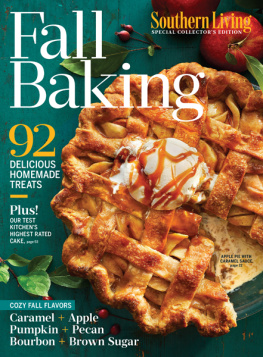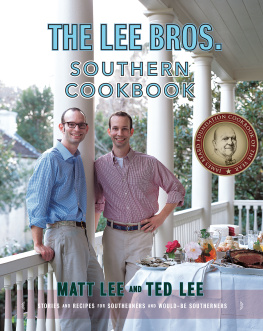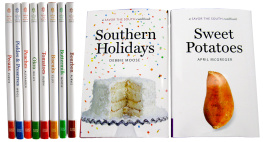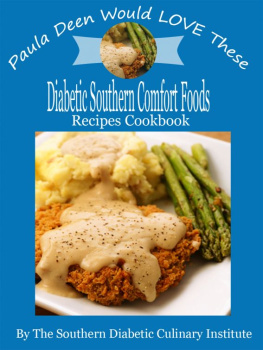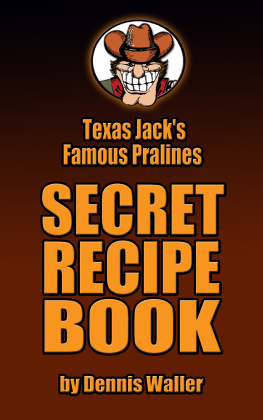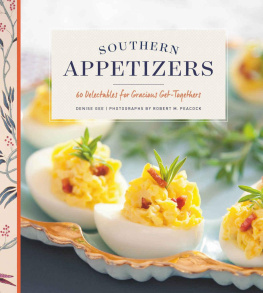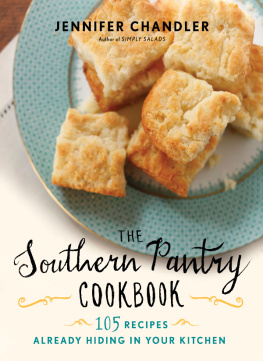Pecans
a SAVOR THE SOUTH cookbook
2012 Kathleen Purvis
All rights reserved. Manufactured in China.
SAVOR THE SOUTH is a trademark of the University of North Carolina Press, Inc.
Designed by Kimberly Bryant and set in Miller and Calluna Sans types by Rebecca Evans.
The paper in this book meets the guidelines for permanence and durability of the Committee on Production Guidelines for Book Longevity of the Council on Library Resources. The University of North Carolina Press has been a member of the Green Press Initiative since 2003.
Library of Congress Cataloging-in-Publication Data
Purvis, Kathleen.
Pecans : a savor the South cookbook / Kathleen Purvis.
p. cm.
Includes index.
ISBN 978-0-8078-3579-1 (cloth: alk. paper)
1. Cooking (Pecans) 2. Cooking, AmericanSouthern style. I. Title.
TX814.P4P87 2012
641.6452dc23 2012010939
16 15 14 13 12 5 4 3 2 1
Contents
Pecans
a SAVOR THE SOUTH cookbook
Introduction
I keep my pecans in the freezer.
Yes, they last longer there, where the cold protects their rich oils and buttery texture. But the freezer doesnt just save my pecans from age.
It saves my pecans from me.
Thats the idea, anyway. The truth is, I cant resist pecans. Never could. Put pecans in any dish, and I will crave it. Show me a recipe with pecans, and I have to try it. Put a bag of shelled pecans in my kitchen, and I will make excuses to dip into it every time it catches my eye.
Freezing them doesnt actually stop me from eating them. The little devils dont freeze hard, so even frozen, theyre easy to eat. (Icy pecans mixed with a few dark chocolate morsels are even better, giving the chocolate a satisfying crunch. But perhaps I shouldnt put that idea in your head.) Still, hiding my pecans in the freezer at least slows me down a little.
My Georgia origins may be to blame for my inability to say no to a pecan. The state where I was born is still the nations leader in growing pecans. Pecans and I both have deep roots in that red clay. Although I have lived all over the South, including eastern North Carolina and several parts of Florida, I was born in Georgia (Columbus) to a Georgia mother (Atlanta) and a Georgia father (Americus) with a hundred years of Georgians behind us.
With that background, we always had pecans in our house. My mother hardly made a cookie, candy, or pan of Sunday dressing without them. My grandmothers best recipes included them. Its hard to remember any occasion, from a picnic to a cocktail hour to a postfuneral spread, when pecans didnt turn up somewhere, mixed in the chicken salad, embedded in the cheese ball, sprinkled on the casserole, or just buttered, salted, and put out by the bowlful.
Family car trips in the summer always included a stop at a Stuckeys, where wed beg for a pecan log. At the holidays, piles of pecans went into my grandmothers special Nibble Mix, which she packed in empty coffee cans and mailed to family and friends scattered all over the South. Pecans in their woody shells filled the special bowl with the nutcracker that was always somewhere near my dads TV chair in the winter.
On a shelf in my kitchen today, I have a black cast-iron nutcracker shaped like a dog, a replica of one that my mother remembers from her grandfathers desk. As a child, if she was good, she was allowed to put a pecan in the dogs jaws and pull down its tail to crack the nut.
For all my love of pecans, I sometimes hesitate to say the word. As a native of South Georgia, my father said pee-can, a pronunciation that drew sniffs of disapproval from my mother, who would point out that a pee-can is something you keep under the bed. She grew up in more urbane Atlanta, where the nut was a pah-cahn. No matter which way I said it, I could expect a rebuke from the other parent. By the time I was an adult, I had developed my own eccentric pronunciation, pee-cahn.
When I began work on this book, I knew I was going to need a whopping amount of nuts. I went online and tracked down a good price from the Gilbert Pecan Company in Texas.
Georgia may be number 1 in pecan production, but Texas runs a close second. (New Mexico is creeping up there, too.)
After a phone chat with a very nice lady, I put in an order for thirty pounds of pecans. A few days later, a large cardboard box arrived on my doorstep. My husband and I hefted it onto the dining room table, slit open the tape, pulled back the flaps, and found ourselves gazing at the largest number of pecans we had ever seen at one time. They werent bagged, just poured straight into the box, right up to the top.
As I grabbed my storage bags and went to work with a scale, I began to notice a heavenly scent. Even raw, that many pecans massed together have a distinct aroma. As I scooped, weighed, and bagged, I contemplated whether pecans actually smell like caramel, or whether so many things made with pecans include brown sugar that I associate their smell with caramel.
Whichever it is, if you ever get a chance to go face-down in thirty pounds of pecans, give a good sniff and let me know what you think.
Whats a Pecan?
My favorite pecan story happened on my very first trip to New York City, the week before Thanksgiving in 1987, when I went up for a long weekend with my friend Kathy.
An early brutal cold snap hit the city, but we were young and city-struck enough that we didnt care. The fact that it was too cold to be outside just gave us an excuse to spend more time inside shopping, and we quickly headed for Macys.
This was long before food-shopping wonderments like Eataly and the Chelsea Market. I hadnt yet seen the food halls at Harrods in London or trolled the cheese stalls of the Rue Mouffetard in Paris. That first experience in the Macys basement was the closest thing to gourmet heaven I had ever seen.
While I wandered through aisles stocked with more kitchen tools than I could imagine using in a lifetime, Kathy stepped into a little alcove packed with holiday cooking ingredients, including a wooden barrel filled to the brim with shelled pecan halves.
Kathy picked out a few things and took her place in line behind a well-dressed woman of the Park Avenue variety.
When the womans turn came, she slapped down a copy of the New York Times food section folded back to a Thanksgiving recipe.
Miss, she said with sniffy hauteur. Where are the pecan meats?
The young clerk nodded at the large barrel of pecans just a few feet away.
Miss Park Avenue looked at them and shook her head.
No, she said dismissively. Those are just pecans. This recipe in the Times calls for pecan meats.
Kathy gathered her courage and leaned in to assure the woman, as a direct import from the South, that those were pecan meats, that pecan meat was just a fancy, New York Times way of referring to a shelled pecan.
The woman shook her off and insisted that was nonsense. The Times had not called for pecans. It had called for pecan meats.
Before Kathy could try again, the clerk looked the woman right in the eye and said calmly, Oh, pecan meats. Were out of those. Try Zabars.
The woman huffed off while the clerk smiled blandly at Kathy. Another dissatisfied customer was off her nerves and deftly transferred to someone elses.
Could we really be so confused about the native nut of America? Italy may have the pignoli and England can claim the walnut. But while America has an affection for the peanut (a nut in name only), the pecan is the true American nut, a native species that started right here.
Growing for the Future, Roots in the Past
Botanically, the pecan is a distant relative of the hickory. George Washington and Thomas Jefferson knew pecans. Although a few sources claim that Washington planted them first at Mount Vernon, most versions of the story are that Jefferson planted them, then sent some to Washington as a gift and urged him to plant them around 1775.
Next page

